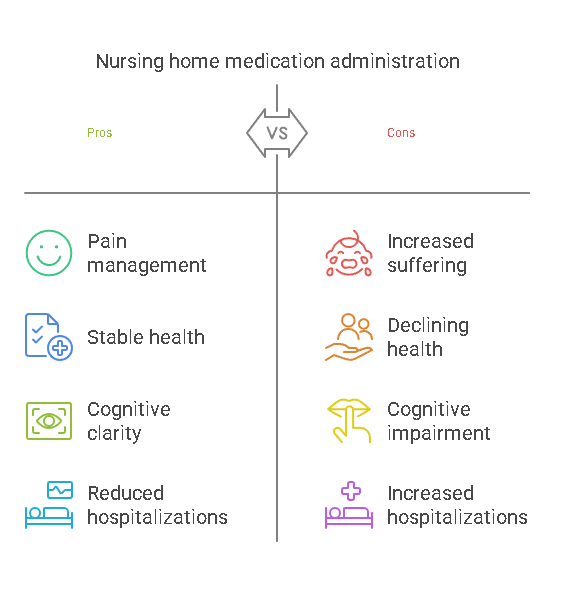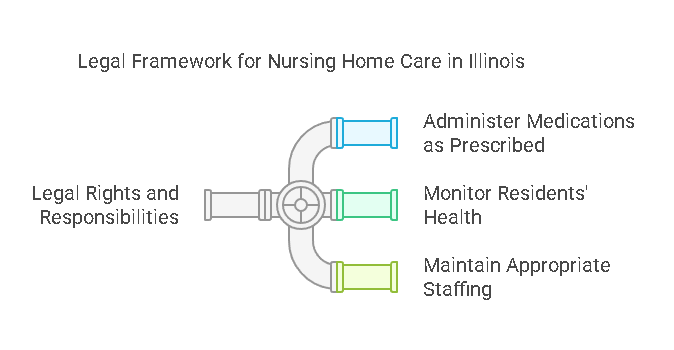Entrusting a loved one to a nursing home should mean they are receiving the care they need to live comfortably and safely. However, nursing home undermedication is an all-too-common problem that can result in severe physical and emotional harm. If your family member is not receiving the proper medications, they may suffer from avoidable pain, suffering, or even worsening of their health condition.
We understand the heartache that comes with knowing your loved one has been neglected or harmed in a nursing home. Our nursing home undermedication attorney in Chicago specializes in cases where facilities fail to administer medications, causing life-threatening consequences. We guide you through the legal process, hold negligent parties accountable, and secure the compensation your family deserves.
Why Choose Our Nursing Home Undermedication Attorney?
At Chicago Injury Lawyer, we are passionate about fighting for justice on behalf of nursing home residents and their families. We understand the emotional and physical toll that undermedication can take on an elderly loved one. Hence, we are here to make sure that nursing homes are held accountable for their neglect.
Experience
Our nursing home injury lawyers’ team has years of experience handling nursing home abuse and neglect cases, including undermedication.
Compassionate support
We provide families with personal, compassionate legal support during this challenging time.
Aggressive representation:
We fight tirelessly on behalf of our clients, ensuring they receive the compensation they rightfully deserve.
Proven Track Record
With a history of successful cases, we have earned a reputation as trusted advocates for victims of nursing homes under medication and neglect. Our goal is to secure the maximum compensation for you.
Free Consultation
We offer a free initial consultation, allowing you to understand your legal options and start your path toward justice without financial obligation.
Choosing the right attorney is crucial when it comes to securing justice for nursing home residents. Let our Chicago nursing home personal injury attorney team help you take action today.
What Is a Nursing Home Under Medication?
Nursing homes undermedicate when residents are not given the appropriate or prescribed medication. This can occur for several reasons:
- Staff negligence: Nurses or caregivers may fail to administer medications on time or skip doses.
- Financial incentives: Some facilities undermedicate residents to reduce costs or cut corners on care.
- Inadequate staffing: Understaffed facilities struggle to provide proper care for residents, resulting in missed or incorrect medication administration.
- Miscommunication: A failure in communication between medical staff or doctors may lead to errors in medication management.
Undermedication can cause serious harm to residents, including worsening existing conditions, unnecessary pain, or even preventable medical emergencies.
Why Nursing Home Undermedication is Dangerous
Nursing home residents rely on proper medication to maintain their health. When they don’t receive the prescribed dosages, the consequences can be dire:
- Increased suffering: Without proper pain management, residents may experience severe discomfort or anxiety.
- Declining health: Failure to take essential medications, such as those for chronic conditions, can lead to rapid deterioration.
- Cognitive impairment: Undermedication can contribute to confusion, agitation, and even permanent cognitive decline.
- Increased hospitalizations: Health conditions often worsen without necessary medication, leading to preventable hospital stays.
If your loved one is showing signs of undermedication, such as increased distress, confusion, or physical decline, it’s crucial to seek legal counsel.

Common Symptoms of Nursing Home Undermedication
Recognizing the signs of a nursing home undermedication is critical to protecting your loved one’s health. If you notice any of the following symptoms, it could indicate that the nursing home is failing to administer proper medications.
| Symptom | Description |
| Increased Confusion or Memory Loss | Residents may experience more frequent forgetfulness, confusion, or disorientation, which can signal medication errors. |
| Physical Decline | Unexplained weight loss, fatigue, or weakness may suggest that necessary medications are not being administered. |
| Unexplained Pain | Complaints of pain that should have been managed by prescribed medication could indicate an undermedication problem. |
| Behavioral Changes | Mood swings, irritability, or signs of depression may arise due to a lack of necessary medications. |
| Increased Risk of Falls | Lack of medication may impair balance, leading to an increase in falls and injuries. |
| Deteriorating Health Conditions | Existing health conditions, such as diabetes or hypertension, may worsen without proper medication. |
| Sleep Disturbances | Difficulty sleeping or irregular sleep patterns may indicate that required sedatives or sleep aids are not being administered. |
If you notice any of these symptoms, it’s important to consult with a healthcare professional immediately and seek legal counsel to protect your loved one’s rights.
How Much Does It Cost to Hire an Undermedication Lawyer in Chicago?
Undermedication—when a patient is not given the proper dosage or is denied critical medication—can result in worsening conditions, unmanaged pain, or even preventable death. If you or a loved one has suffered because of such negligence, hiring an experienced undermedication lawyer in Chicago usually involves no upfront costs. Most attorneys take these cases on a contingency fee basis, which means you only pay if they win compensation for you. Legal fees typically range from 30% to 40% of your recovery, and your initial consultation is free.
Undermedication Lawyer Cost Calculator
* This is an estimate. Rates may vary based on jurisdiction, case complexity, and lawyer experience.
Legal Rights for Nursing Home Undermedication Errors in Illinois
In Illinois, nursing homes are required to provide residents with adequate care and treatment, including proper medication management. If your loved one has been harmed due to undermedication, you may have the right to pursue a claim under Illinois law.
The Illinois Nursing Home Care Act outlines the rights of nursing home residents and establishes care standards. This includes properly administering medications and ensuring residents receive all prescribed treatments. Under the Act, nursing homes are required to:
- Administer medications as prescribed: This includes ensuring medications are provided on time and in the right dosage.
- Monitor residents’ health: Staff must observe residents for any side effects or reactions from medications.
- Maintain appropriate staffing: Nursing homes must have enough trained personnel to manage medication administration safely.
If a nursing home violates these standards, it can be held legally responsible for any harm caused, including personal injury claims or even wrongful death lawsuits, if the undermedication results in fatal consequences.

How to File a Personal Injury Claim for Nursing Home Undermedication
If the nursing home’s undermedication has harmed your loved one, you may be entitled to compensation. The process of filing a personal injury claim can seem overwhelming, but our experienced team is here to guide you through every step.
Step 1: Document the evidence
Collect medical records, prescription history, and any documentation showing that your loved one was not receiving their medications properly.
Step 2: Consult with an attorney
Contact a qualified nursing home undermedication lawyer to evaluate your case and discuss your legal options.
Step 3: File a claim
Your attorney will help you file a personal injury claim or wrongful death lawsuit, seeking compensation for medical bills, pain and suffering, and other damages.
Step 4: Seek compensation
If successful, you may receive compensation for medical costs, emotional distress, and other related expenses.
Act Now to Protect Your Loved One’s Rights
If your loved one has suffered from nursing home undermedication in Chicago, don’t wait to seek legal help. Time is of the essence in personal injury and wrongful death claims, and your family deserves justice. Contact Personal Injury Lawyer today for a free consultation, and let us help you hold negligent nursing homes accountable.
Frequently Asked Questions
How do I know if my loved one is being undermedicated?
Signs of undermedication include confusion, fatigue, unexplained pain, and changes in behavior.
Can I sue a nursing home for undermedication?
Yes, if your loved one has suffered due to undermedication, you may be able to file a personal injury claim or wrongful death lawsuit under Illinois law.
What compensation can I receive in a nursing home undermedication case?
You may be entitled to compensation for medical bills, pain and suffering, emotional distress, and other damages.
How long do I have to file a claim?
Illinois has a statute of limitations for personal injury claims, so acting quickly is important. Contact us for a free consultation today.



